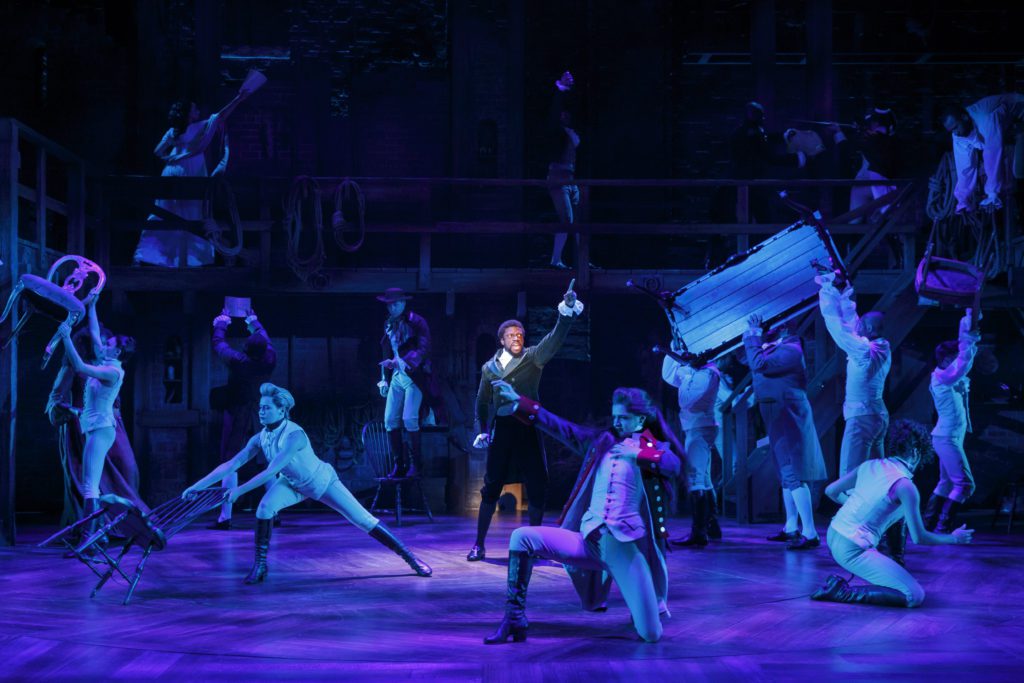‘Hamilton’ Popping Eyes, Ears, Minds in D.C.
By • June 21, 2018 0 839

Founding Father Alexander Hamilton — in the form of the Broadway smash “Hamilton,” winner of 11 Tony Awards — has finally landed in Washington, D.C., ensconced until Sept. 16 with tremendous, original energy in the Kennedy Center Opera House.
Not surprisingly, the musical, the handiwork of the gifted Lin-Manuel Miranda (book, lyrics and music), is already being showered with accolades, superlatives and the kind of reviews only God gets on Sundays. The phrases “best musical ever written” and “one of the great musicals of all time” are on record.
In truth, “Hamilton” is probably near if not at the top of the heap. But this dazzling, eye-, ear- and mind-popping musical, often described as a “hip hop” version of the founding of these United States, is something better than that.
Miranda’s “Hamilton” accomplishes something bigger — the musical drags the genre’s past kicking and screaming into the future. There’s been a lot of talk in the performing arts community, especially among the larger institutions, where tickets and costs are rising, about the future, specifically about how to attract new audiences from the exploding millennial population.
“Hamilton.” That’s how you do it. The musical doesn’t so much wipe out the form as transform it, complete with echoes from the past. It’s not so much a hip hop musical — with smart, electric rapping and lyrics, which doubles the words flying out like a drumbeat on steroids — as it is a new kind of musical, replete with echoes of Rogers and Hammerstein (who revolutionized the form in their day), Sondheim, Fosse and Kander and Ebb, with a dash of Stephen Foster and days gone by.
Here’s something else that you don’t see that often: that elusive new audience, accompanied by the old audience, all intrigued by the blockbuster show.
Miranda is kind of cheeky when you think about it. He’s dared to stage a rocket-powered, contemporary-sounding, heart-pounding story of the Founding Fathers with Hamilton, the most elusive spirit of the American Revolution and its aftermath, whose life was cut short in a duel with former vice president Aaron Burr, at its center.
And he’s done it with a multi-ethnic cast, with most of the Founders played by African American performers. Most remarkably, he’s brought Hamilton himself — a Caribbean-born orphan of parentage unknown — into the forefront where, we now see, he belongs.
Played with fierce and uncompromising charisma by Austin Scott, Hamilton had his unfulfilled ambitions. He wanted to have a military command and to be secretary of state, but instead became treasury secretary. In that role, he laid the groundwork and did the grunt work in creating the not overly wealthy new nation’s financial institutions, including the National Bank, tariffs and trade mechanisms. He wrote most of what constituted the Federalist Papers (and who knew they could be so much fun in the form of the song “Non-Stop”?), created the Coast Guard and so on and so on.
The production moves at the speed of light and rap, which allows the company — thanks to Andy Blankenbuehler’s leaping lizards, overdrive choreography — to cover enormous ground: the courtship of Elizabeth Schuyler; the presence of a très French Lafayette and a rock star-like Jefferson, both played with here-and-now verve by Bryson Bruce; and Washington — very much the father of his country, as played by Carvens Lissaint — taking charge, with Hamilton as his go-to guy.
You can see the idea of country — if not necessarily democracy — take shape, with different visions by rivals Jefferson (the People) and Hamilton (the Republic).
Miranda based his portrait of Hamilton on Ron Chernow’s massive 800-page biography, a lively work, but the play is livelier still. Hamilton is no saint — he’s got arrogance to spare, is a hopeless philanderer, ambitious but also visionary, fueled by honor and the possibility of the future. Which is to say: here we are.
I came to this with a certain amount of skepticism — nothing can be this good, you think. But it can. Forty songs, full-bodied characters and characterizations, a portrait of an imperfect but fully visualized political invention.
Watching, listening to, embracing the show, you realize that it’s full of hope, energy and a quicksilver potential to be brand new and different every night and day, which is, after all, the full potential and glory of live theater and performance.
In these confusing times, it’s not difficult to imagine each production as meaningfully fresh, new, different each time out — of necessity, but also out of a need to reimagine it. And it’s not out of reach to imagine the show as it is, one production, indivisible, with glory for everyone.

